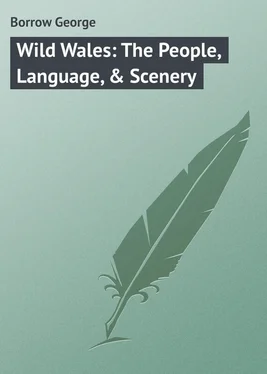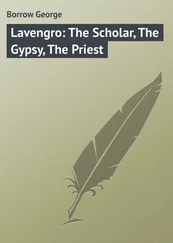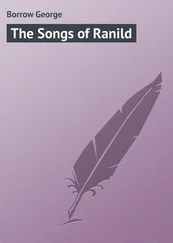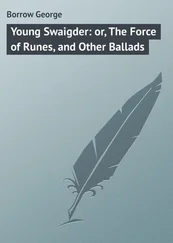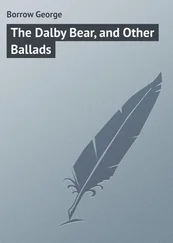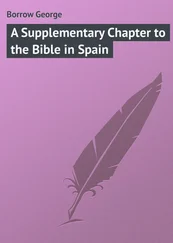George Borrow - Wild Wales - The People, Language, & Scenery
Здесь есть возможность читать онлайн «George Borrow - Wild Wales - The People, Language, & Scenery» — ознакомительный отрывок электронной книги совершенно бесплатно, а после прочтения отрывка купить полную версию. В некоторых случаях можно слушать аудио, скачать через торрент в формате fb2 и присутствует краткое содержание. Жанр: foreign_prose, Путешествия и география, на английском языке. Описание произведения, (предисловие) а так же отзывы посетителей доступны на портале библиотеки ЛибКат.
- Название:Wild Wales: The People, Language, & Scenery
- Автор:
- Жанр:
- Год:неизвестен
- ISBN:нет данных
- Рейтинг книги:5 / 5. Голосов: 1
-
Избранное:Добавить в избранное
- Отзывы:
-
Ваша оценка:
- 100
- 1
- 2
- 3
- 4
- 5
Wild Wales: The People, Language, & Scenery: краткое содержание, описание и аннотация
Предлагаем к чтению аннотацию, описание, краткое содержание или предисловие (зависит от того, что написал сам автор книги «Wild Wales: The People, Language, & Scenery»). Если вы не нашли необходимую информацию о книге — напишите в комментариях, мы постараемся отыскать её.
Wild Wales: The People, Language, & Scenery — читать онлайн ознакомительный отрывок
Ниже представлен текст книги, разбитый по страницам. Система сохранения места последней прочитанной страницы, позволяет с удобством читать онлайн бесплатно книгу «Wild Wales: The People, Language, & Scenery», без необходимости каждый раз заново искать на чём Вы остановились. Поставьте закладку, и сможете в любой момент перейти на страницу, на которой закончили чтение.
Интервал:
Закладка:
“If so,” said he, “let me hear you translate the two lines on the title-page.”
“Are you a Welshman?” said I.
“I am!” he replied.
“Good!” said I, and I translated into English the two lines which were a couplet by Edmund Price, an old archdeacon of Merion, celebrated in his day for wit and poetry.
The man then asked me from what part of Wales I came, and when I told him that I was an Englishman was evidently offended, either because he did not believe me, or, as I more incline to think, did not approve of an Englishman’s understanding Welsh.
The book was the life of the Rev. Richards, and was published at Caerlleon, or the city of the legion, the appropriate ancient British name for the place now called Chester, a legion having been kept stationed there during the occupation of Britain by the Romans.
I returned to the inn and dined, and then yearning for society, descended into the kitchen and had some conversation with the Welsh maid. She told me that there were a great many Welsh in Chester from all parts of Wales, but chiefly from Denbighshire and Flintshire, which latter was her own county. That a great many children were born in Chester of Welsh parents, and brought up in the fear of God and love of the Welsh tongue. That there were some who had never been in Wales, who spoke as good Welsh as herself, or better. That the Welsh of Chester were of various religious persuasions; that some were Baptists, some Independents, but that the greater parts were Calvinistic-Methodists; that she herself was a Calvinistic-Methodist; that the different persuasions had their different chapels, in which God was prayed to in Welsh; that there were very few Welsh in Chester who belonged to the Church of England, and that the Welsh in general do not like Church of England worship, as I should soon find if I went into Wales.
Late in the evening I directed my steps across the bridge to the green, where I had discoursed with the Irish itinerants. I wished to have some more conversation with them respecting their way of life, and, likewise, as they had so strongly desired it, to give them a little Christian comfort, for my conscience reproached me for my abrupt departure on the preceding evening. On arriving at the green, however, I found them gone, and no traces of them but the mark of their fire and a little dirty straw. I returned, disappointed and vexed, to my inn.
Early the next morning I departed from Chester for Llangollen, distant about twenty miles; I passed over the noble bridge and proceeded along a broad and excellent road, leading in a direction almost due south through pleasant meadows. I felt very happy – and no wonder; the morning was beautiful, the birds sang merrily, and a sweet smell proceeded from the new-cut hay in the fields, and I was bound for Wales. I passed over the river Allan and through two villages called, as I was told, Pulford and Marford, and ascended a hill; from the top of this hill the view is very fine. To the east are the high lands of Cheshire, to the west the bold hills of Wales, and below, on all sides a fair variety of wood and water, green meads and arable fields.
“You may well look around, Measter,” said a waggoner, who, coming from the direction in which I was bound, stopped to breathe his team on the top of the hill; “you may well look around – there isn’t such a place to see the country from, far and near, as where we stand. Many come to this place to look about them.”
I looked at the man, and thought I had never seen a more powerful-looking fellow; he was about six feet two inches high, immensely broad in the shoulders, and could hardly have weighed less than sixteen stone. I gave him the seal of the morning, and asked whether he was Welsh or English.
“English, Measter, English; born t’other side of Beeston, pure Cheshire, Measter.”
“I suppose,” said I, “there are few Welshmen such big fellows as yourself.”
“No, Measter,” said the fellow, with a grin, “there are few Welshmen so big as I, or yourself either, they are small men mostly, Measter, them Welshers, very small men – and yet the fellows can use their hands. I am a bit of a fighter, Measter, at least I was before my wife made me join the Methodist connexion, and I once fit with a Welshman at Wrexham, he came from the hills, and was a real Welshman, and shorter than myself by a whole head and shoulder, but he stood up against me, and gave me more than play for my money, till I gripped him, flung him down and myself upon him, and then of course ’twas all over with him.”
“You are a noble fellow,” said I, “and a credit to Cheshire. Will you have sixpence to drink?”
“Thank you, Measter, I shall stop at Pulford, and shall be glad to drink your health in a jug of ale.”
I gave him sixpence, and descended the hill on one side, while he, with his team, descended it on the other.
“A genuine Saxon,” said I; “I dare say just like many of those who, under Hengist, subdued the plains of Lloegr and Britain. Taliesin called the Saxon race the Coiling Serpent. He had better have called it the Big Bull. He was a noble poet, however: what wonderful lines, upon the whole, are those in his prophecy, in which he speaks of the Saxons and Britons, and of the result of their struggle —
“A serpent which coils,
And with fury boils,
From Germany coming with arm’d wings spread,
Shall subdue and shall enthrall
The broad Britain all,
From the Lochlin ocean to Severn’s bed.
“And British men
Shall be captives then
To strangers from Saxonia’s strand;
They shall praise their God, and hold
Their language as of old,
But except wild Wales they shall lose their land.”
I arrived at Wrexham, and having taken a very hearty breakfast at the principal inn, for I felt rather hungry after a morning’s walk of ten miles, I walked about the town. The town is reckoned a Welsh town, but its appearance is not Welsh – its inhabitants have neither the look nor language of Welshmen, and its name shows that it was founded by some Saxon adventurer, Wrexham being a Saxon compound, signifying the home or habitation of Rex or Rag, and identical, or nearly so, with the Wroxham of East Anglia. It is a stirring bustling place, of much traffic, and of several thousand inhabitants. Its most remarkable object is its church, which stands at the south-western side. To this church, after wandering for some time about the streets, I repaired. The tower is quadrangular, and is at least one hundred feet high; it has on its summit four little turrets, one at each corner, between each of which are three spirelets, the middlemost of the three the highest. The nave of the church is to the east; it is of two stories, both crenelated at the top. I wished to see the interior of the church, but found the gate locked. Observing a group of idlers close at hand with their backs against a wall, I went up to them and addressing myself to one, inquired whether I could see the church. “O yes, sir,” said the man; “the clerk who has the key lives close at hand; one of us shall go and fetch him; by the bye, I may as well go myself.” He moved slowly away. He was a large bulky man of about the middle age, and his companions were about the same age and size as himself. I asked them if they were Welsh. “Yes, sir,” said one, “I suppose we are, for they call us Welsh.” I asked if any of them could speak Welsh. “No, sir,” said the man, “all the Welsh that any of us know, or indeed wish to know, is Cwrw da.” Here there was a general laugh. Cwrw da signifies good ale. I at first thought that the words might be intended as a hint for a treat, but was soon convinced of the contrary. There was no greedy expectation in his eyes, nor, indeed, in those of his companions, though they all looked as if they were fond of good ale. I inquired whether much Welsh was spoken in the town, and was told very little. When the man returned with the clerk I thanked him. He told me I was welcome, and then went and leaned with his back against the wall. He and his mates were probably a set of boon companions enjoying the air after a night’s bout at drinking. I was subsequently told that all the people of Wrexham are fond of good ale. The clerk unlocked the church door, and conducted me in. The interior was modern, but in no respects remarkable. The clerk informed me that there was a Welsh service every Sunday afternoon in the church, but that few people attended, and those few were almost entirely from the country. He said that neither he nor the clergyman were natives of Wrexham. He showed me the Welsh Church Bible, and at my request read a few verses from the sacred volume. He seemed a highly intelligent man. I gave him something, which appeared to be more than he expected, and departed, after inquiring of him the road to Llangollen.
Читать дальшеИнтервал:
Закладка:
Похожие книги на «Wild Wales: The People, Language, & Scenery»
Представляем Вашему вниманию похожие книги на «Wild Wales: The People, Language, & Scenery» списком для выбора. Мы отобрали схожую по названию и смыслу литературу в надежде предоставить читателям больше вариантов отыскать новые, интересные, ещё непрочитанные произведения.
Обсуждение, отзывы о книге «Wild Wales: The People, Language, & Scenery» и просто собственные мнения читателей. Оставьте ваши комментарии, напишите, что Вы думаете о произведении, его смысле или главных героях. Укажите что конкретно понравилось, а что нет, и почему Вы так считаете.
